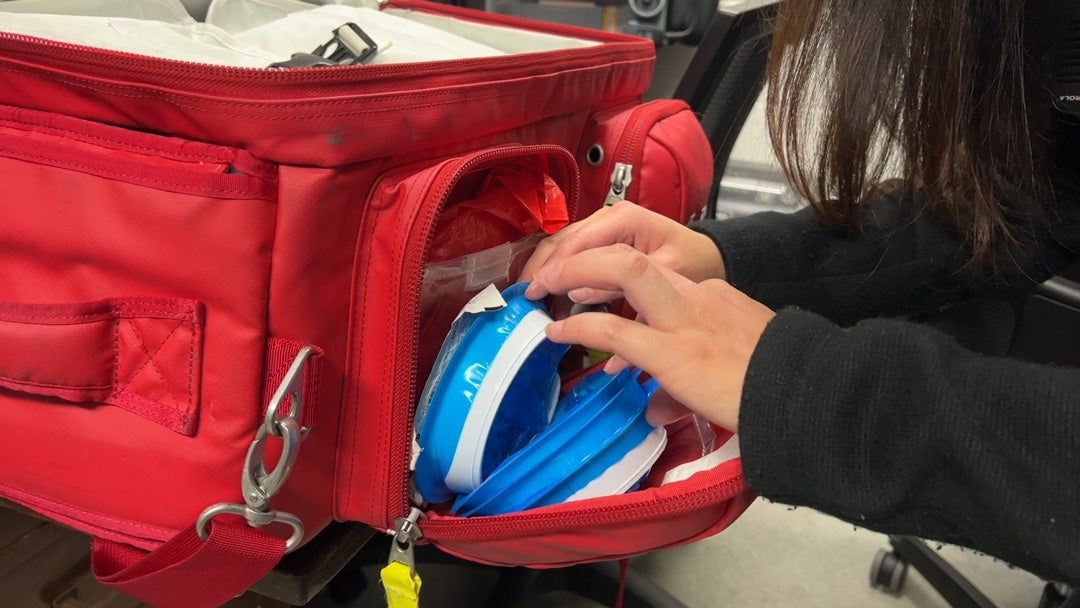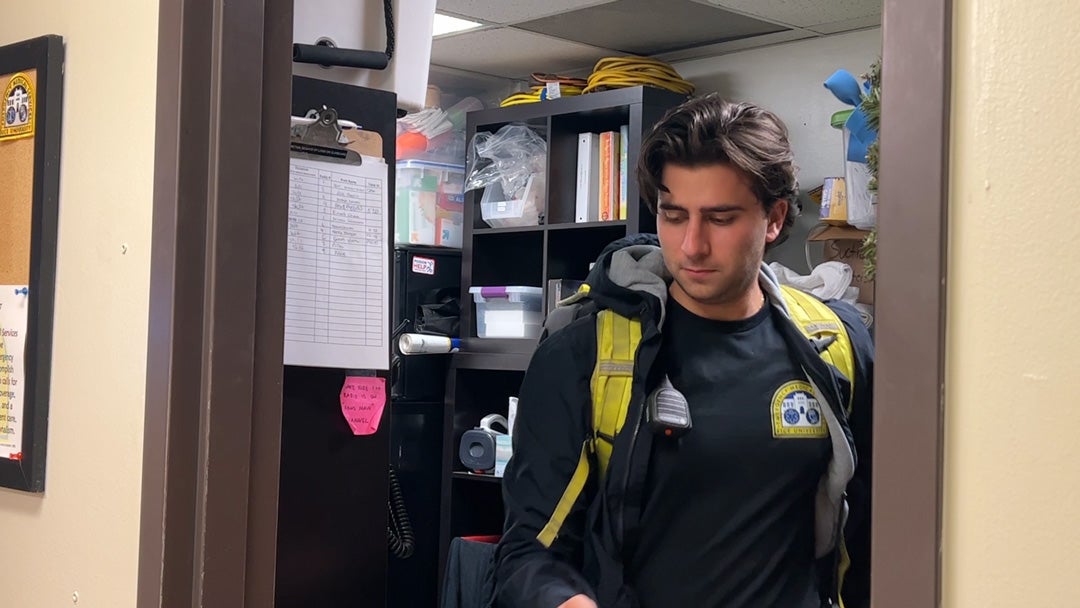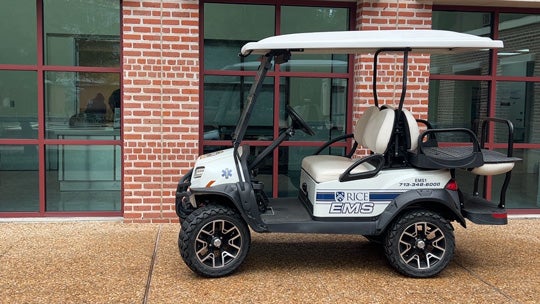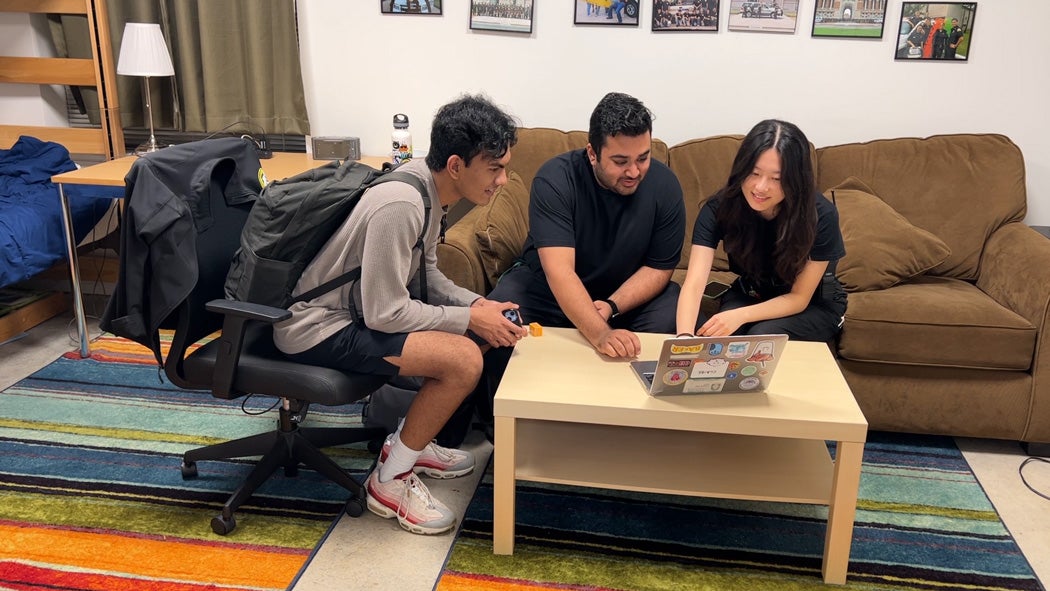As the Rice Owls prepare to face off against the Texas State Bobcats in the 2023 SERVPRO First Responder Bowl, a game all about recognizing fire, police and EMT professionals throughout our communities, the spotlight includes the student volunteers of Rice University Emergency Medical Services (REMS). Rice is the only private Texas university with 24/7 EMS volunteers.
Whether it’s a cart parked outside a residential college or a marked vehicle patrolling the inner loop, REMS is omnipresent on campus. The organization has been around for 27 years and is currently staffed by roughly 70 undergraduate volunteers, all certified as emergency medical technicians (EMTs) and advanced EMTs.
“Collegiate EMS is an amazing niche of EMS to work in. It’s a bunch of young people who are really interested in getting involved in the field,” said Lisa Basgall, who has served as the program’s administrative and operations director for the past 15 years. “This is a high-stakes thing that we do to respond to people who are having emergencies and need actual help.”
Rice junior Perry Gilberd is part of REMS leadership, holding the title of InCharge, which is who you’ll see behind the wheel of REMS-marked vehicles around campus.
“It’s a thing like no other,” Gilberd said. “There’s a lot of responsibility with it, but at the same time, REMS does everything it can to prepare you to, at the end of the day, make campus a safer place and have students here fully trust that we’re well-equipped to handle any medical emergency that they call us for.”
Trust is vital because, in most cases, REMS volunteers like junior Milan George are responding to calls from other students.
“Rice has an amazing culture of care, so they know that Rice EMS will respond, check them out, and if they’re good to go, they’re good to go,” George said. “If not, we’ll provide the care that they need.”
Some REMS volunteers, including Gilberd and junior Claire Shi, aspire to medical school.
Others, such as George, are leaning on their experience to help their future communities in a different way. He got certified as an EMT while he was still in high school. REMS is what lured him to Rice, where he’s majoring in social policy analysis.
“I worked during the pandemic and what I found was that there are a lot of disparities, especially where I’m from in South Texas, along the border,” George said. “There’s a lot of disparities in who receives treatment, the time to receive treatment.”
The majority of REMS volunteers don’t enroll at Rice already certified as EMTs. Most get started by enrolling in Emergency Medical Technician (EMSP 281) and Advanced EMT (EMSP 282), during which they can earn their certification. Then they can apply to join REMS.
“A unique aspect of REMS is that it’s completely volunteer-based and made up of college students, so it’s college students helping college students,” Shi said. “I think it’s a really strong testament to the Rice culture of care.”
Shi, a biosciences major, begins her shifts in the Duncan room. Complete with a bathroom, bunk bed, desk and couch, it’s a spot for REMS volunteers to hang out, catch up on homework or even take a nap.
“We have a radio on us and our pager on us at all times, so if there’s a call, we just kind of drop everything and go,” Shi said.
A photo wall in the Duncan room also highlights the history of REMS, displaying past volunteers, some who are still active today.
“Dr. (Hashim) Zaidi (Will Rice ’11) was a student here when I started. Dr. (Cameron) Decker (Martel ’07) had just graduated,” Basgall said, explaining that they are now the medical directors of REMS.
Watching students evolve into graduates then professionals who continue to serve Rice is one of the things Basgall said she enjoys most about her role.
“It’s about building partnerships and building part of the community,” she said.
That community is stronger today thanks to the generations of volunteers who answered their peers’ calls for help.
Summarized Gilberd: “We’re always working to make Rice a better place.”




